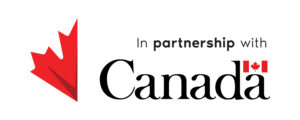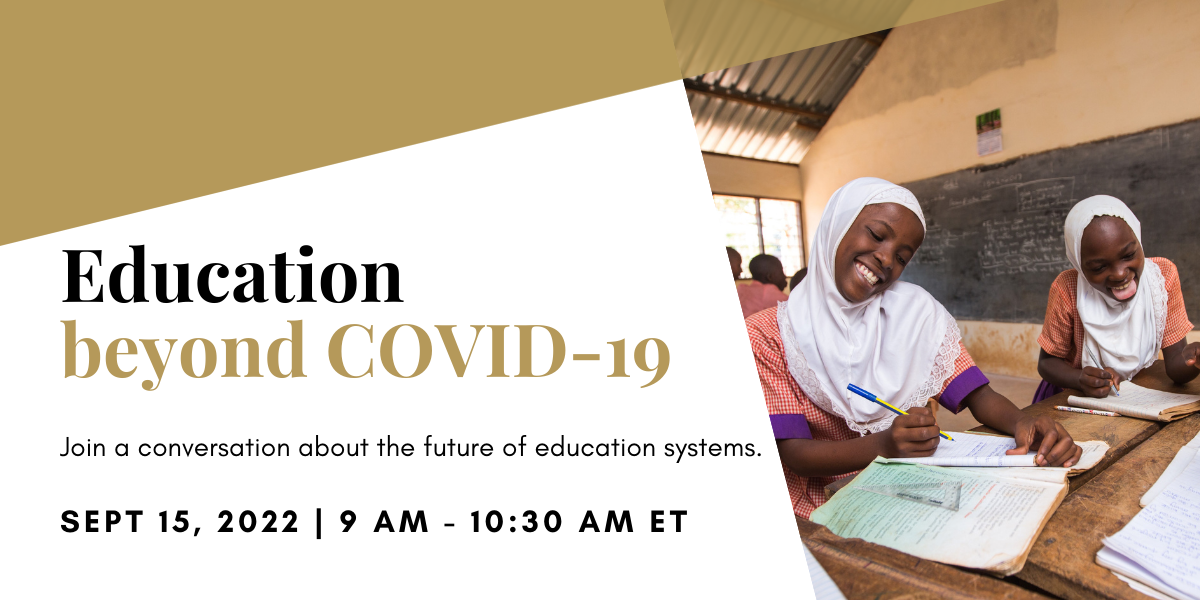Since its onset, the COVID-19 pandemic has affected all aspects of life.
For the education sector, the pandemic disrupted education systems, increased inequalities, and exacerbated existing issues in global education, particularly affecting the most vulnerable learners. As communities continue to work towards greater sustainability and resilience, understanding COVID-19’s socioeconomic impacts is crucial to improving livelihoods and developing well-functioning and durable institutions and systems.
On September 15, Aga Khan Foundation Canada (AKFC) hosted an event on the future of education systems. The event highlighted a recent education policy paper developed by Dr. Fernando Reimers and his students (Farhan Karim, Cecelia Scheuer, Ishani Parekh, and Nathalia Trujillo) from Harvard University’s Graduate School of Education.
The paper was selected to be a chapter (Ch. 5) in an edited publication entitled Advancing a New Social Contract for Education. The resulting book was featured on UNESCO’s website and featured a forward by Stefania Giannini, UNESCO’s Assistant Director-General for Education.
Watch the event recording:
About the event
Moderator:
Khalil Z. Shariff
CEO, Aga Khan Foundation Canada
Panelists:
Dr. Fernando Reimers
Ford Foundation Professor of the Practice of International Education and Director of the Global Education Innovation Initiative at Harvard University
Dr. Reimers is an expert in the field of global education. His research and teaching focus on understanding how to educate children and youth so they can thrive in the 21st century. Dr. Reimers was a member of UNESCO’s Commission on the Futures of Education, which published the report Reimagining Our Futures Together: A New Social Contract for Education. He has developed curriculum aligned with the United Nations’ Sustainable Development Goals, which are used in schools throughout the world. During the COVID-19 pandemic, he has led numerous comparative studies examining the educational consequences of the pandemic and identifying options to sustain educational opportunities and to build back better.
He directs the Global Education Innovation Initiative, a cross-country research and practice collaborative focusing on education for the 21st century and has written or edited 45 books.
Louise Holt
Director General, Social Development, Global Issues and Development Branch, Global Affairs Canada
Louise Holt obtained a Bachelor of Arts (Hons) in Economics and Comparative Development Studies from Trent University in 1989. She later completed her Masters’s in Public Administration from Carleton University in 1995 and joined the Department of Foreign Affairs and International Trade in 2002. At Headquarters, she has served as the Deputy Director, Gender Equality and Women’s Human Rights (2002-2005); as Director, Social Development Policy (2005 to 2009); and as Director, Sector and Thematic Specialist Division (2009 to 2012) at the Canadian International Development Agency. She has served overseas in Nairobi from 2012 to 2014 and in Pretoria from 2014 to 2016 as Counsellor and Director of Development. From 2016 to 2018, Ms. Holt served as Director General, Canadian Partnerships for Health and Social Development, and as Director General, Partnership for Gender Equality from 2018-2020. She is currently Director General, Social Development, Global Issues and Development Branch.
Atrash Ali
Area Manager, Kenya Coast Region, Aga Khan Foundation
Atrash Mohamed Ali has worked for the Aga Khan Foundation in Kenya since May 2001 managing different projects from various sectors including, Kenya School Improvement Project (KENSIP), Strengthening Education Systems in East Africa (SESEA), Education for Marginalised Children in Kenya (EMACK), Supporting Civil Society Initiatives (SCSI), Youth Economic and Social Empowerment, ICT in Education among others. He is the Area manager, Kenya Coast Region. He holds expertise in pedagogy, overall teacher development, education management, and managing social sector programs.
Before joining the Foundation, Atrash worked for the Ministry of Education, Save of Souls Schools (SoS) in Lamu and Mombasa He worked closely with other NGOs supporting Kenyan communities. Prior to joining AKF, he was the District Primary School Inspector also doubling up as National Trainer of Strengthening Primary Teacher Education Programme (SPRED) and Primary School Management Project (PRISM). He has long experience in project planning, organizing implementation work, building, and leading effective teams He has designed and implemented several holistic community-based projects which were highly attributed to improving the quality of life of the targeted beneficiaries.
Sara McGinty
Education Advisor, Plan Canada
Sara McGinty has over twenty years of experience in Education and Program Management gained in Canada; Southern, Eastern, and North Africa; and Central Asia.
From 2010 to 2021, Sara McGinty worked with UNICEF in various capacities, including in humanitarian and development settings, working towards ensuring access to quality inclusive education. Sara supported program development and implementation, and guided upstream policy work and coordination with key actors and decision-makers, to contribute to achieving SDG Goal 4. Prior to her UN career, she was also a former World Bank Consultant and Research Supervisor at the University of Toronto.
Sara has a Master of Arts in Comparative, International, and Development Education from the University of Toronto, a Bachelor of Education, and a Bachelor of Arts, with Honours, with a Specialization in Mathematics, including Statistics from Queen’s University.
With closing remarks from:
Jean-Bernard Parenteau
Director General, Canadian Partnerships for Health and Social Development, Global Affairs Canada
Jean-Bernard Parenteau joined the Canadian International Development Agency (CIDA) in 1996 and held various positions with development programs covering Ukraine, Russia, and several Central American countries, before being posted to Lima, Peru (2002-2006), where he became the Head of Cooperation (2005-2006). He then successively occupied the positions of Deputy Director for the Tanzania Development Program, and then Director for development programming covering a variety of Sub-Saharan African countries (2010-2015): Cameroon, Rwanda, Democratic Republic of Congo, Nigeria, Benin, and Burkina Faso. As CIDA and the Department of Foreign Affairs and International Trade became amalgamated to form Global Affairs Canada, Jean-Bernard took on the position of Director of Bilateral Relations for West and Central Africa (2015-2019), with the responsibility for political and trade affairs. He holds a BA (1994) and a Master’s degree (1996) in Political Science (International Relations) from Université du Québec à Montréal.
Presentations by:
Farhan Karim, Cecelia Scheuer, Ishani Parekh, and Nathalia Trujillo
From Harvard University’s Graduate School of Education


